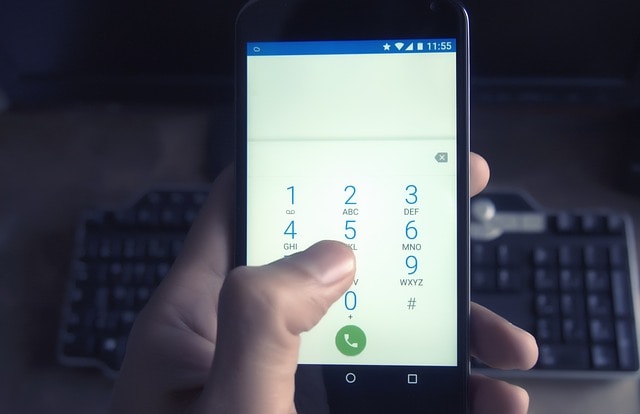You’ve probably noticed an increase in the past year or two in the frequency of phone calls and text messages from spammers and scammers. You may receive a call from an unknown number and are greeted by a pre-recorded message about your auto insurance, electronic device support, or any number of other offers. Or worse, you may be targeted by sophisticated scams, such as callers impersonating law enforcement, the IRS, or debt collectors, who tell you that you’ll be arrested or sued for delinquent payments – that is, unless you pay up over the phone with your personal financial information or gift cards, which are harder to trace and reverse
This trend has been affecting more and more Americans. In 2017, the Federal Trade Commission received a record 4.5 million robocall complaints, up from 3.4 million the previous year. According to data from First Orion, a call protection and management company, approximately 3.7% of all mobile calls in 2017 were spam or scam calls. In 2018, that number rose to 29.2% – nearly a third of all mobile phone calls being scammers. The problem will only get worse: nearly half of all cell phone calls in 2019 are expected to be spam robocalls, according to a study by First Orion.
What is the purpose of spam/scam calls?
First, it’s important to understand the difference between a spam/scam call and a sales call. Legitimate companies who you’ve done business with in the past may have you on a marketing list. Many of these companies will remove you from these lists at your request. Spam and scam calls, however, are illegitimate businesses or thieves using deceptive techniques to get you to provide personal or financial information. Their intention is not to sell, but to steal.
Spam calls vary in purpose, According to a 2017 study from Truecaller, a caller ID and spam blocking service, 43% of spam calls were general nuisances or unwanted disturbances. Scams and fraud attempts made up 29% of calls. Financial services calls from banks and credit institutions accounted for 19% of calls, and 7% were debt collectors. While many of these calls include legitimate companies, criminals use the same technology to scam unwitting individuals or obtain personal information. As discussed below, scammers often hide their true caller ID information to avoid identification and prosecution.
Scammer Techniques
There are a number of techniques to be aware of for spotting spam calls and texts and avoiding scams. One of the more common methods phone scammers use is called “neighborhood spoofing” where scammers use computer software to disguise their phone numbers to appear to be similar to the targeted caller. The idea is that if the number looks similar to yours, including area code and three-digit prefix, you’re more likely to pick up, thinking that it could be a known friend, relative, or coworker.
Because the phone numbers used by scammers are likely faked, calling the number back probably won’t result in a good outcome. You may find that you reach a disconnected number, or worse, a person who actually owns the phone number but was not aware that it was used by a scammer.
What can I do about it?
There are several mobile apps and services that are somewhat useful in reducing the number of spam and scam calls to your cell phone. These apps can save consumers a lot of headache and interruption.
However, one major drawback of these apps is that they’re only able to block phone numbers found on their master list of known “bad” numbers. If a scammer spoofs the phone number of a legitimate business or individual, the call is less likely to be blocked, since the number won’t raise any red flags. Third-party apps are great for blocking spam calls from “burner” numbers and prefixes commonly used by scammers using virtual calling software, but not so much when they spoof a random number from the White Pages or a legitimate business.
Nonetheless, having a spam call blocking app may be somewhat helpful in reducing the number of spam calls received. Below are some options to consider.
NoMoRobo
NoMoRobo screens incoming calls by comparing them with its list of known and suspected scam numbers. If the number is a match, the call is blocked. NoMoRobo won the Federal Trade Commission’s Robocall Challenge in 2013, which challenged the private sector to develop ways to efficiently block robocalls.
YouMail
YouMail is another service which screens incoming calls against a database of known scam numbers. In addition, YouMail can also play a dial tone to the caller, so they scammer thinks that the number is disconnected. YouMail’s basic functions are free and compatible with iOS, Android, and landline numbers. Users can upgrade to a paid plan for additional functionality.
RoboKiller
Robokiller claims to block over 1.1 million known spam numbers from reaching your phone. The app also has an “Answer Bots” feature which you can enable to waste the scammer’s time with pre-recorded messages and sounds.
Truecaller
Truecaller is a free mobile app for iOS and Android which alerts you to potential spam and scam calls before you pick up.
Hiya
Hiya offers a free app that identifies incoming calls and blocks numbers you want to avoid.
You can also check with your cell phone carrier for their specific solutions. Verizon Wireless offers a Caller Name ID app which has a built-in spam filter. AT&T users can enable Call Protect, which automatically blocks spam calls and suspected fraudulent numbers. T-Mobile uses Scam Block to prevent spam and scam calls. Sprint offers Premium Caller ID which can flag incoming calls as suspicious.
Other Resources & Best Practices
Here are a few more tools and tips for blocking spam calls and reducing your risk of becoming a target of a phone scam:
- Just Don’t Answer: While it may not be the best solution, one tactic is to avoid answering calls from any phone number that you don’t recognize. Scammers will rarely leave a voicemail message. Answering a spam call and talking or interacting with a machine by pressing numbers only reassures the spammers that your number is alive and well.
- Do Not Call Registry: Register your phone number with the FTC’s National Do Not Call Registry. This will stop legitimate sales and telemarketing calls, but certain organizations are still allowed to call, including charities, political groups, debt collectors, and survey groups. Adding your number to the registry also won’t stop scam and fraudulent calls.
- Never Trust, Always Verify: Don’t give out personal, confidential, or financial information over the phone to unsolicited callers. Verify that the call is legitimate by contacting the company directly through their website or customer service phone number.
- IRS Scams: Be extremely cautions of anyone claiming to be from the IRS. Scammers are notorious for using scare tactics, such as impersonating the IRS and claiming that an individual will be arrested for failing to pay taxes. These scammers demand credit card and banking information over the phone. Consumers should be aware that the IRS will contact you through official postal mail should you have any tax issues.
- Debt Collectors: If you receive a call from someone claiming to be a debt collector, hang up and contact your bank or credit card company directly through their public customer service phone number or website. An official representative should be able to see if there are any issues with your account.
- Forward Spam Texts: If you receive a spam text message from an unknown sender, forward the message to SPAM (7726). Most wireless providers participate in this reporting program to attempt to block future spam messages.
How can a Private Investigator help?
Believe it or not, private investigators may be able to help with reducing the number of spam and scam calls you receive. Private investigators conduct scam investigations and frequently work on identity theft cases to trace the potential source of a scam. Private investigators specialize in finding personal information, such as phone numbers, which means they also know how to hide it.
If spam and scam callers are ringing your phone off the hook, it could be because your phone number is floating around the internet as an active number. A private investigator can help remove your personal information from the internet, including your phone number and home address. Removing this information from free access may reduce the amount of spam calls you receive as well as reduce your risk of identity theft.



